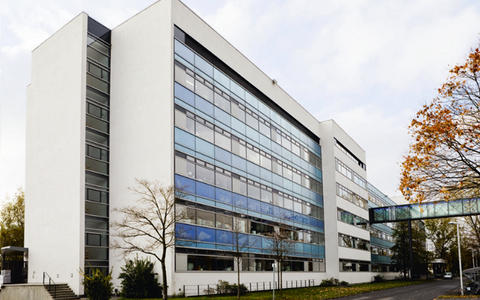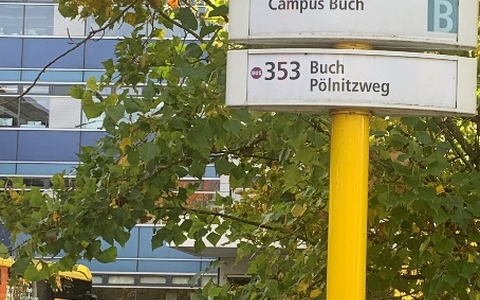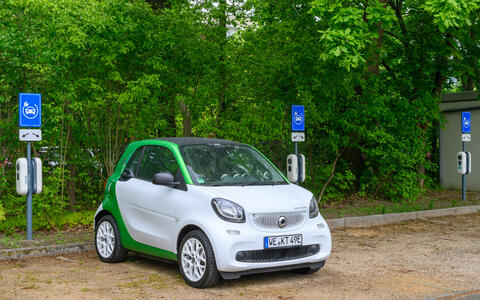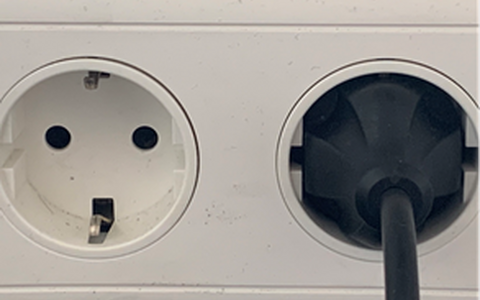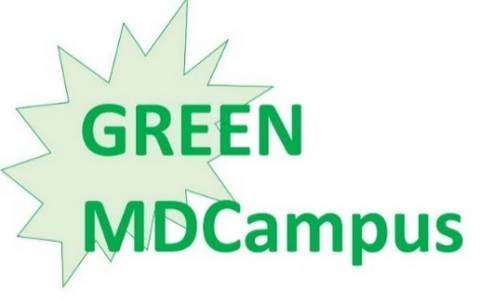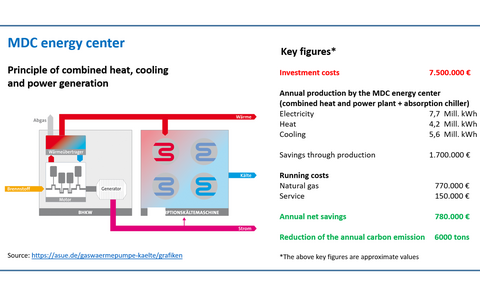
Sustainable Development
Taking responsibility
With the 2030 Agenda, the United Nations has defined goals for socially, economically and ecologically sustainable development, known as the 17 Sustainable Development Goals (SDGs). With its research approach, the MDC contributes to SDG 3 - ensure healthy lives for all people of all ages and promote their well-being. In addition, the Center also supports other goals of the 2030 Agenda and wants to fulfill its responsibility towards the environment and society as well as towards its employees*. Therefore, in 2020/21 we developed the concept "Our path to a sustainable MDC", which combines already established activities with newly formulated goals and measures. After all, sustainable action helps to ensure the success and attractiveness of the MDC over the long term.
We want to:
- establish a common understanding of leadership
- create scope for creativity and encourage employees to be innovative
- promote sustainable development in organizational development, research, human resources, and in the areas of construction and infrastructure and support processes
- make the work at MDC as greenhouse gas neutral as possible by 2038
The MDC - represented by the Sustainability Coordinator - contributes to in the Sustainability Forum working group of the Helmholtz Association and maintains networks on sustainability at the local and regional level (including the NUHF network) in order to integrate "best practice" examples and achieve synergy effects.
Sustainable development at MDC - examples
- Climate-friendly renovation of the Max Delbrück House
-
The MDC is planning the climate-friendly renovation of its largest research building, the Max Delbrück House (MDH), and has obtained 13.7 million euros in funding from the Helmholtz Association for this purpose. The biggest challenge is the building's high energy demand: 8,000 MWh per year, 80% for operating the ventilation and air-conditioning systems alone. Renovation is expected to begin at the end of 2024.
Teamwork
2021, Ralf Streckwall, head of the Technical Facility Management (TFM) department, has put together an interdisciplinary project team. In addition to internal specialists, the team includes the sustainability coordinator, laboratory planners Gert Richter (freelance) and Markus Fenner (EUROLABORS AG), and experts in building energy technology Clemens Beutler (DGNB GMBH), Dr. Stefan Brand and Prof. Martin Kriegel (both TU Berlin).
Drastically reducing energy and CO2 emissions
In several workshops with the board of directors, scientists and representatives from administrative departments, the team discussed possibilities for a structural redesign of the laboratories, offices and ancillary laboratory areas. Subsequently, a concept was developed that pursues two central goals: 1. drastic reduction (63%) of energy consumption through optimization of laboratory infrastructure and innovative concepts for air handling systems, 2. transformation of building energy systems to enable campus-internal supply with renewable energy sources. In this way, MDC will save 3,000 tons of CO2 emissions in the future.
The demonstrator laboratory
The first construction phase is designed as a demonstrator lab: "This allows the team to test the effective interaction of new technologies and verify whether the predicted savings potentials are actually achieved," says Ralf Streckwall. The researchers, in turn, can give their feedback and suggest improvements. The knowledge gained will be used for the further construction phases and can provide important impetus for the climate-friendly construction of biomedical research buildings.
- MDC business travel form with appeal "train instead of flight”
-
The MDC business trip form explicitly states that business trips are only permitted if the official business cannot be completed by using digital means of communication. It also receives an appeal to use the train if the business trip destination can be reached within six hours.
- 49 € Deutschlandticket as a job ticket
- Change, save money and reduce CO2 emissions
-
© Michael Hinz, MDC
From May 1, 2023, employees with an MDC contract will have the opportunity to purchase the €49 Deutschlandticket as an attractive job ticket from S-Bahn Berlin GmbH. The MDC will pay each employee a subsidy of €15 per month. With this measure, the MDC wants to contribute to reducing the carbon dioxide emissions caused by daily commuting. Switching from the car to public transportation provides a reduction of approximately 65-75 percent.
- Promotion of e-mobility - e-charging stations on Campus Buch
-
© Peter Himsel/Campus Buch
To improve the expansion of environmentally friendly mobility, the campus has been looking for a solution that is as cost-neutral as possible and can be used flexibly: Campus Berlin-Buch GmbH, together with MDC, FMP and ECRC, is now cooperating with the energy agency E.MAGIS. Currently, three double charging stations for e-vehicles are available to users. There they can fill up with 100 percent green electricity. Further expansion is planned.
- 100 % green power - 3000 tons less CO2 emission per year
-
© Michael Hinz, MDC
The Buch Campus and the MDC in Berlin-Mitte/BIMSB have been supplied with 100 percent green electricity since 2020. Campus Berlin-Buch GmbH currently purchases certified green electricity from a hydroelectric power plant in South Tyrol. This alone reduces the MDC's annual carbon emissions by about 3,000 tons.
- Green MDCampus - working together for a sustainable MDC
-
© Green MDCampus
All employees can contribute to the sustainable development of the MDC with their ideas. Some employees from science and administration are committed in the "Green MDCampus" initiative, which was already active from 2013 to 2016. They want to create awareness for sustainable working with newsletters, various measures and campaigns. For example, the aim is to produce less waste, use less plastic, use more recycled products and save energy.
The initiative calls on employees to work together to make the sustainable development of MDC lively and comprehensible.
- Energy transition at the MDC - Producing electricity, heat and cooling yourself
The MDC departments responsible for technical building management want to make research buildings more energy efficient and establish systems for independent energy production. One example is the photovoltaic systems on buildings 31.1 (30 kilowatts) and 31.4 (7 kilowatts). The largest project to date was the renovation of the energy center with the construction of a combined heat, power and cooling plant (see graphic). Its aim: to secure demand, use energy efficiently and reduce carbon emissions.
Innovative techniques pay off
The energy center was renovated between 2011 and 2013 at a cost of approximately 7.5 million euros. The new high-efficiency plant consists of several elements. In a combined heat and power plant, natural gas is converted into electricity and heat. An absorption chiller, three compression chillers and five hybrid cooling towers produce cooling from some of the heat. Research centers like the MDC require an enormous amount of cooling power for the research buildings, the animal house and the computer center - currently about 3800 kilowatts. In order to be able to respond to even higher demands if necessary, the plant allows for further expansion stages.
This investment will pay off in the long term, and doubly so - both in terms of climate protection and financially. The combined heat, power and cooling plant produces the entire cooling requirement as well as more than a third of the MDC's electricity and heating requirements. Its utilization rate is over 90 percent. Thanks to the short pipeline routes of the local interconnected network on the MDC site, much less energy is also lost than on long supply routes. Compared to conventional combined heat and power plants, this plant reduces annual carbon emissions by about 6,000 metric tons. By producing cooling, heat and electricity independently, the MDC can save approximately 780,000 euros net each year. The plant has therefore paid for itself after ten years.
In the future, MDC will continue to invest in innovative technologies during construction and renovations that further reduce the energy consumption of the buildings or enable independent energy production. The MDC Campus Plan 2030 is currently being discussed. It is intended to set the course for further optimization of the existing facility as well as additional measures for a sustainable energy supply.
Sustainability Officer Michael Hinz on the topic of sustainability at the MDC
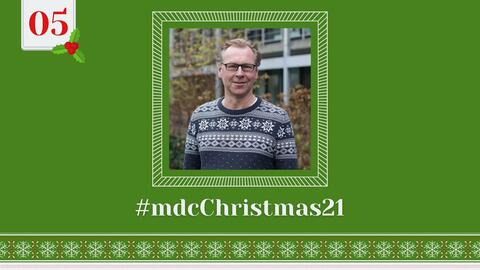
Documents
Our path to a sustainable MDC (pdf)
MDC Greenhouse Gas Balance 2022 (pdf)
MDC Greenhouse Gas Balance 2021 (pdf)
MDC Greenhouse Gas Balance 2019/2020 & Potential Climate Strategie (pdf)
Sustainability at the Helmholtz Association (only in German)
Sustainability at the Helmholtz Association
1. Helmholtz Sustainability Summit (MDC)
2. Helmholtz Sustainability Summit (DESY)
Helmholtz sustainable active 2018 (pdf)
Helmholtz sustainable active 2021 (pdf)

